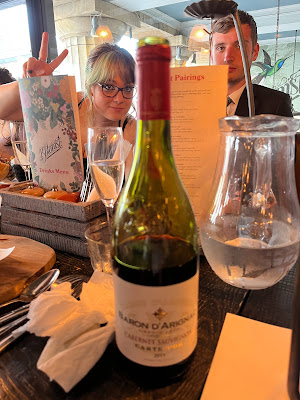"Alloa Gold" Scottish Pale Ale
 |
| Thanks to Stuart Critchley on Untapped for the photo, every other one was just awful. |
Like the previous beer, “Alloa Gold” hails from Scotland. Its creation was a collaboration between Beer 52 and Crisp, a company that specialised in the growing of brewing malt. In the case of this beer, the can is proudly adorned with a label stating the malt is 100% Scottish, in growth, malting and packing. The actual brewing was done by Williams Bros. Brewing, a company based out of Glasgow. The brewery was founded in 1988 as a family business and their website has several interesting stories relating to their operation included in the “Our Story” section (that can be found here). One such story is below:
“In 1988 a lady of Gaelic descent came into the shop with a translation of the recipe for “Leanne Fraoch” that had been handed down through the generations. It was her simple goal to recreate a batch of this historic brew to share with her family […]. This ancient process is said to date to 2000 BCE…”
Further types of beers brewed by Williams Bros. Brewing include a “Scottish Pine Ale” based on a “Viking recipe” (likely by Norse or Danish settlers, rather than raiders), a “Gooseberry Wheat Ale” that has its origins with a group of 16th century monks, and a “Elderberry Black Ale”, that was apparently introduced to the Scottish Highlands by some Welsh Druids. Personally, I find this fascinating! I love that this brewery is using historical recipes to recreate beers from the past so that modern audiences can try them; it’s somewhat like experimental archaeology, and that’s something that I can 100% get behind. As to the name of this specific beer, “Alloa Gold” references the location of the current brewery, the town of Alloa in the central Lowlands of Scotland.
In a somewhat related note, I remembered that I should probably cancel my Beer 52 subscription as whilst getting these beers for only £5.95 was an amazing deal, the normal price of £27 for the box is a little steep for my recently-graduated-from-university budget to have as a monthly subscription. I must say though, that the more time I think about the price, it’s only around £3.40 a can, and all the beers included are from small, independent breweries with interesting stories to tell and products to sell. I don’t think that the Beer 52 subscription is too expensive, I just don’t personally have the budget to have it for multiple months.
So now for my verdict on the beer? What is it like? Well, it’s definitely more IPA-like in its hoppiness and florality, but not as much as most of the IPAs that I have been subjected to before. If I whip out my limited wine tasting experience, I find that the beer has somewhat of a caramel smell to it, obviously combined with the smell of beer. This caramel note can be found in the taste of the beer too, but to a much lesser degree, instead with the hops and floral tastes taking precedence. The bitterness that these lend to the beer make the caramel notes more akin to the burned sugar taste that comes from caramel that has caught in the pan, or honeycomb that has burnt in the oven. It’s a strange flavour to include in a beer in my opinion, as I doubt that many have positive memories of the taste of burnt sugar, but maybe some do, what do I know. Overall, I like this beer less than the last two I’ve reviewed, mainly due to the strong floral flavours that dominate the mouth after the first second or two. For this reason, I wouldn’t get this beer again, but I’d recommend it to people who like this type of beer. I am very intrigued by the historical beers that Williams Bros. Brewing produces, but will definitely be avoiding their more modern creations.








